

Depression is a common condition that impacts approximately 264 million people worldwide. With stress and anxiety levels at new highs because of the viral pandemic, mental health issues are becoming more and more important. While we may not yet fully realize the impact the pandemic has had on global mental health, it is clear everyone is experiencing more stress today. With anxiety and depression rates seemingly increasing, many may be curious. What is depression? How is it different from feeling sad or lonely?Depression differs from regular mood fluctuations and small behavioral reactions to daily difficulties in a few ways. One important characteristic of depression is that negative emotions often begin to adversely affect the physical body in some way and/or disrupt a person’s daily life.Depression can be hazardous to one’s health, especially if it persists for an extended period of time and occurs with a moderate – to – severe frequency.Similarly, depression is a condition that needs to be supervised by a professional. When you feel that you cannot manage, don´t hesitate to ask for help! Without adequate treatment, depression can lead an individual to inevitably struggle and underperform in the workplace, schooling, and even at home.Depression is caused by the complex interplay of societal, emotional, and biological variables. Research suggests that poor health resulting from chronic medical conditions can put an individual at risk for developing depression. Cardiovascular illness, for instance, can cause depressive feelings and can eventually progress to a full, clinical depression. More insidiously, however, certain medical conditions can affect the body in ways that cause or contribute to mental illness, usually in the form of depression.

There are many ways we can treat and cure depression but, in some cases, antidepressant medication and other forms of therapy do not work. When medications and other treatments fail, it may be necessary to search for organic causes of depression–typically certain medical conditions known to manifest as mental illness.
Underlying Causes of Depression – A Symptom of Hypo and Hyperthyroidism:
There are many reasons you can suffer from depression. Depression is typically caused by a mixture of life events, external concerns, and internal variables, rather than by a single immediate problem or incident.Some of these variables include family issues and stressors, job stress, substance abuse, and health decline. When depression occurs in the setting of a medical condition, there are usually many factors that contribute to the onset of the mental illness.However, there is one medical condition that disturbs the body in such a way that can cause or contribute to the development of mental illness, usually depression. Science has shown that abnormalities in thyroid hormone balance can affect our mood and psychological state. Yes, you read it right!Hormones are endocrine gland-produced chemicals that have a significant impact on a multitude of bodily functions. Organs such as the adrenals, thyroid, hypothalamus, and pituitary have an impact on development and growth, mood, sex drive, fertility, and metabolic rate.Several hormones, like those supplied by the thyroid gland, can have an impact on depression. Furthermore, certain manifestations of depression are linked to thyroid issues. Generally, the severity of the thyroid condition correlates with the severity of the psychological abnormalities.
Hormone Crosstalk Can Affect Mood
Hormones do not function alone. There is significant crosstalk and interaction between different hormones, and the levels of one hormone can affect the levels and activity of another. As we have mentioned before, thyroid hormones generally function to control metabolism, energy, and bodyweight, but thyroid hormone level fluctuations may, in turn, affect the work of other hormones.Let’s look at the interplay between the hormone cortisol and the thyroid hormones. Mood problems caused by thyroid level abnormalities can often cause a stressed state. This causes our cortisol levels to initially rise.
Thyroid hormone fluctuations affect the release of these two hormones as well. When you suffer from hypothyroidism your pituitary gland will automatically produce more and more TSH to stimulate more thyroid hormone production so your TSH levels will be high in case of hypothyroidism.
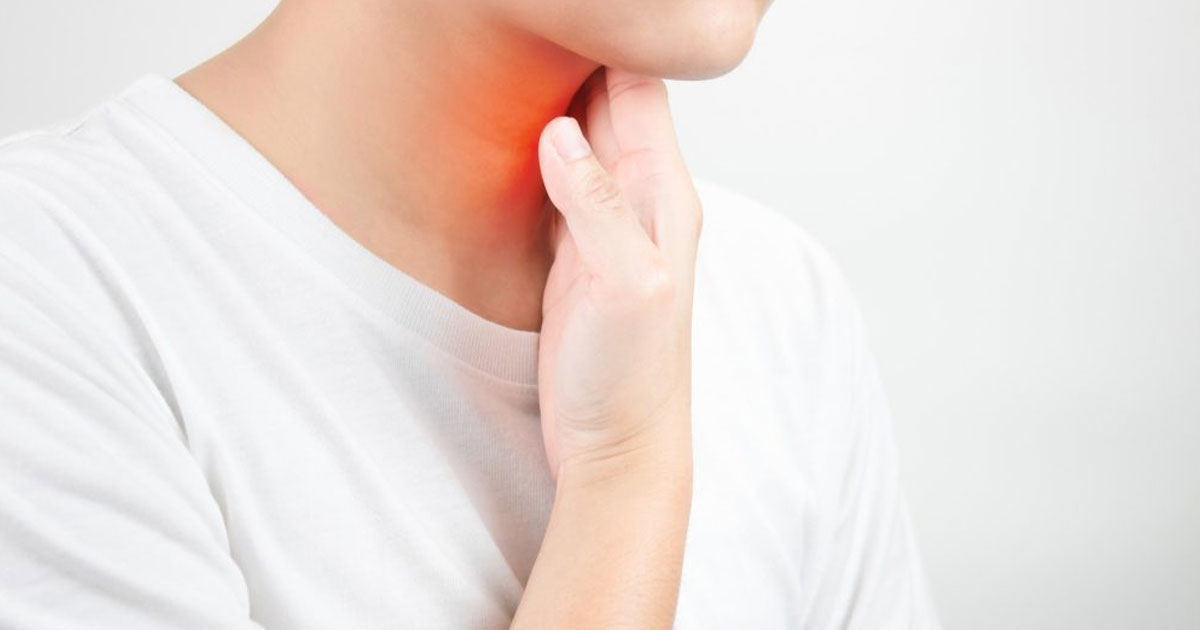
The thyroid gland “communicates” with other hormone-releasing organs like the hypothalamus using signaling hormones like TSH. The interaction is very complex, but the main thing to remember is that when one hormone level becomes abnormal, there is often an effect on other hormones.This is why depression, whether it’s caused by thyroid hormone abnormalities or other causes, can also cause sexual dysfunction and other hormonal-related problems.
TSH, T3, T4, and Role of High RT3:
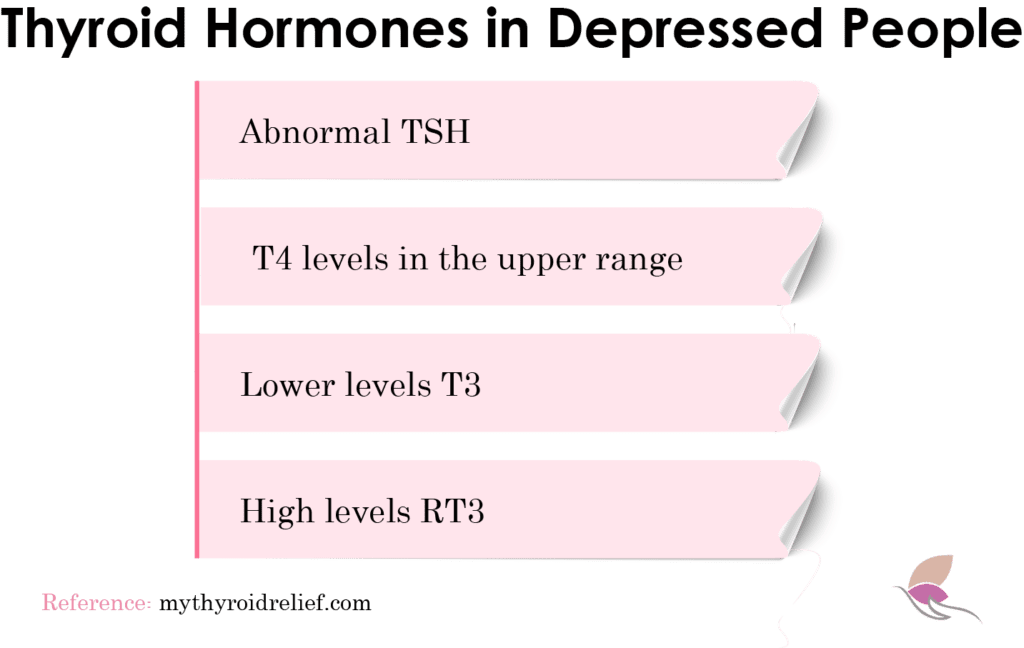
There are a few thyroid hormones that are usually addressed by abbreviations for ease. These are T4, T3, and reverse T3 or rT3. We already looked at TSH, which is one of the “communication” hormones. While still being researched, many studies have observed abnormal thyroid hormone levels in patients with depression.Serum T4 levels in depressed individuals have been observed to be in the upper range of normal or somewhat higher when compared to healthy people. These elevations can decline following effective depression therapy. Other studies have found that the level of T3 is lower with an increase in the levels of rT3 in depression. Some studies suggest that mild hypothyroidism leads to increased TSH levels which in turn contribute to depression.Typically, elevated total T3 levels or free T3 levels may indicate the presence of hyperthyroidism. Lower T3 and higher RT3 values may indicate hypothyroidism. T3 lab tests are frequently matched with T4 and TSH test findings to aid in the diagnosis of thyroid illness. However, if you have questions about your lab tests, a trained medical professional can best help you interpret the results.
Most commonly, it seems that hypothyroid (underactive) conditions are related to depression and hyperthyroid (overactive) situations often result in anxiety and panic attacks. Both conditions can have significant effects on mood, and it’s important to consider thyroid health when approaching mental illness.
Common Symptoms of Hypothyroidism and Depression:
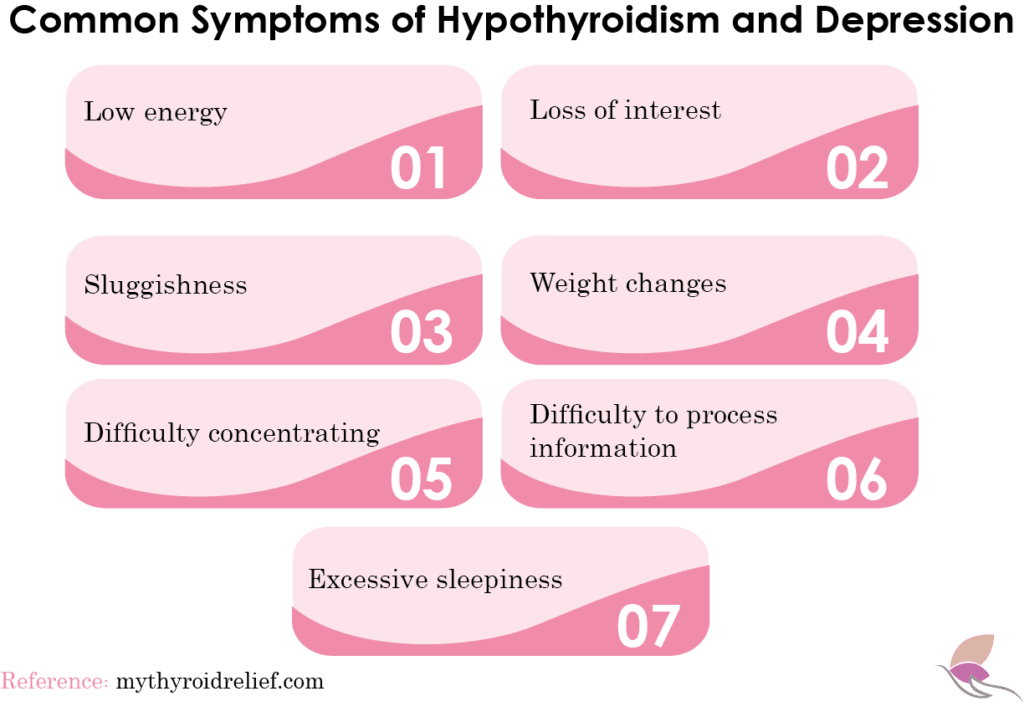
Even though they are distinct disorders, depression can be a sign of hypothyroidism. As mentioned before, hypothyroidism occurs when the thyroid gland is unable to generate enough thyroid hormone. Medications can increase those levels, and this can help or eliminate your problems, particularly depression.Both depression and hypothyroidism share similar symptoms. The difficulty that medical professionals encounter is distinguishing if a person has depression or depressive symptoms caused by hypothyroidism. Some of the shared symptoms include weariness, sluggishness, difficulty concentrating, and the need for excessive sleep.
However, Hypothyroidism has One Unique Symptoms:
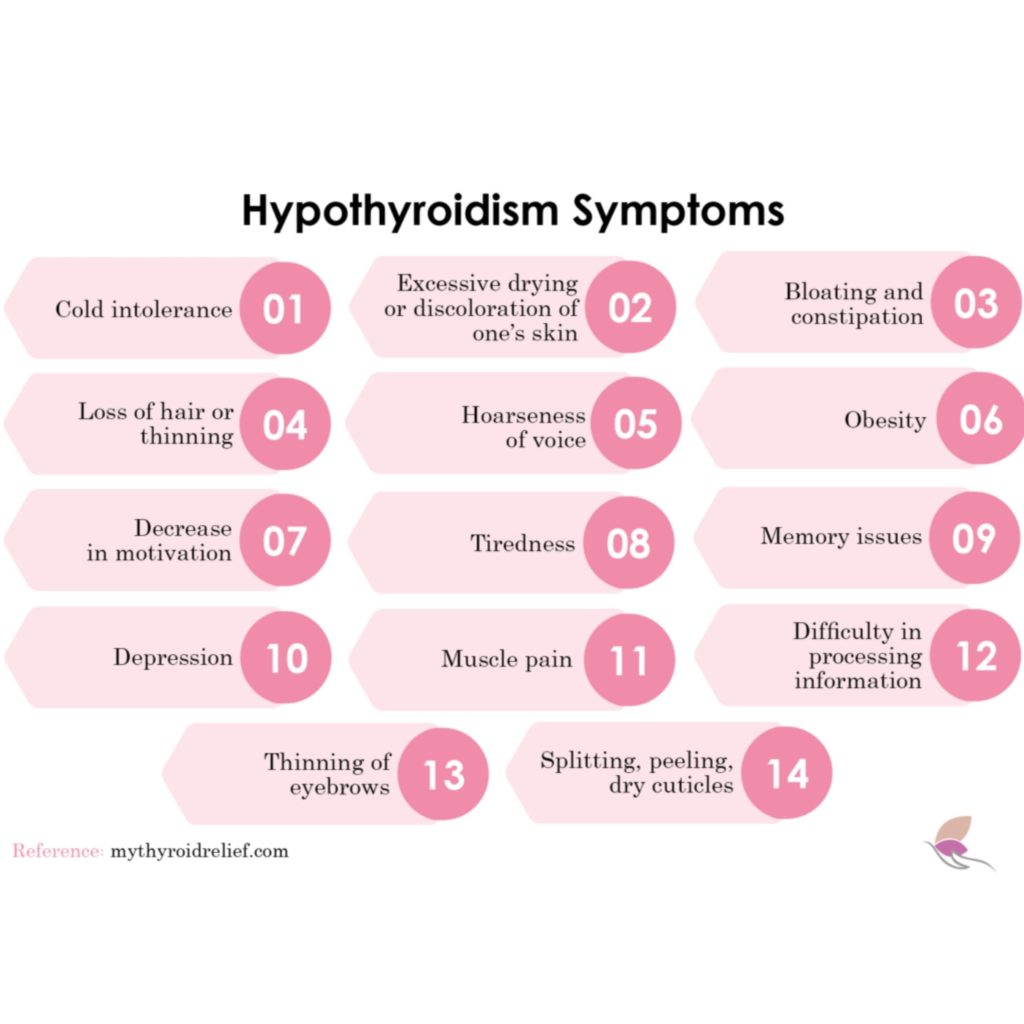
- Cold intolerance.
- Excessive drying or discoloration of one’s skin.
- Hoarseness of voice.
- Loss of hair or thinning.
- A decrease in motivation.
Additionally, there are some signs of hypothyroidism that can change a person’s appearance. These physical manifestations can contribute to the emotional changes that are associated with depression:
- Bloating
- Obesity
- Memory issues
- Difficulty in processing information
- Tiredness
Common Symptoms of Hyperthyroidism and Depression:
If the thyroid gland is hyperactive, the metabolic functions in your body accelerate. The features of a hyperactive metabolism include panic attacks or anxiousness.
However, if you are tense, irritable, sluggish, or fatigued, you could have hyperthyroidism. Other signs and symptoms of hyperthyroidism include hand tremors, a rapid or irregular heartbeat, shortness of breath at rest, feeling extremely hot, profuse sweating, and/or having warm, red, itchy skin.
Weight Gain or Loss – A Cause of Low Self Esteem:
Among the most typical symptoms of thyroid disease is an unexpected weight fluctuation. Excess weight is associated with hypothyroidism. On the other hand, if there is an excess of thyroid hormone, you may experience surprising weight loss. Significant changes in one’s physical appearance can lead to diminished self-esteem and courage.
When these bodily changes are taken together with some of the other hormonal abnormalities that occur when our endocrine system is dysfunctional, it is easy to see how one’s mood and general emotional wellbeing can be adversely affected.

How to Diagnose and Self Check Yourself
The only reliable method for determining if you have an endocrine problem is to get a blood test that measures your thyroid and sex hormone levels. These tests are typically performed by your doctor, although there are more opportunities to obtain blood work without a physician.The thyroid function test measures the amounts of thyroid-stimulating hormone (TSH) and thyroxine (T4) in the plasma. This is sometimes referred to as the “free” T4 by physicians (FT4). RT3 and Thyroid antibody tests are performed to rule out Hashimoto’s and Graves’ disease. All of these tests help determine your overall thyroid health and functioning level.Some of these are Mental Health Assessment, Depression screening Test, Anxiety test, etc. But it would be best to immediately consult a medical professional if you think you have signs and symptoms of depression.And of course, if you have severe depressive thoughts or feelings, do not hesitate to contact a mental health provider. If you have hurtful thoughts and feelings about yourself or others, some countries have crisis hotlines and emergency services that you can contact. Don’t hesitate to seek immediate help in these circumstances.
How to Prevent Thyroid Related Issues and Use the Right Medication
- Minimize Processed Food: Many chemicals might interfere with thyroid hormone synthesis. (Plastic containers, cosmetics additives, fluoride in your water supply, mercury dental amalgams, etc.)
- Hormones, pesticides, and bromide found in our food supply. Look for organic produce whenever possible.
- Limit Soy: Limit or eliminate your soy consumption. Soy can have drastic, negative endocrine effects, including negative effects on sex hormone balance.
- Quit Smoking
- Stress reduction
- Exercise regularly, yoga helps in coping with depression.
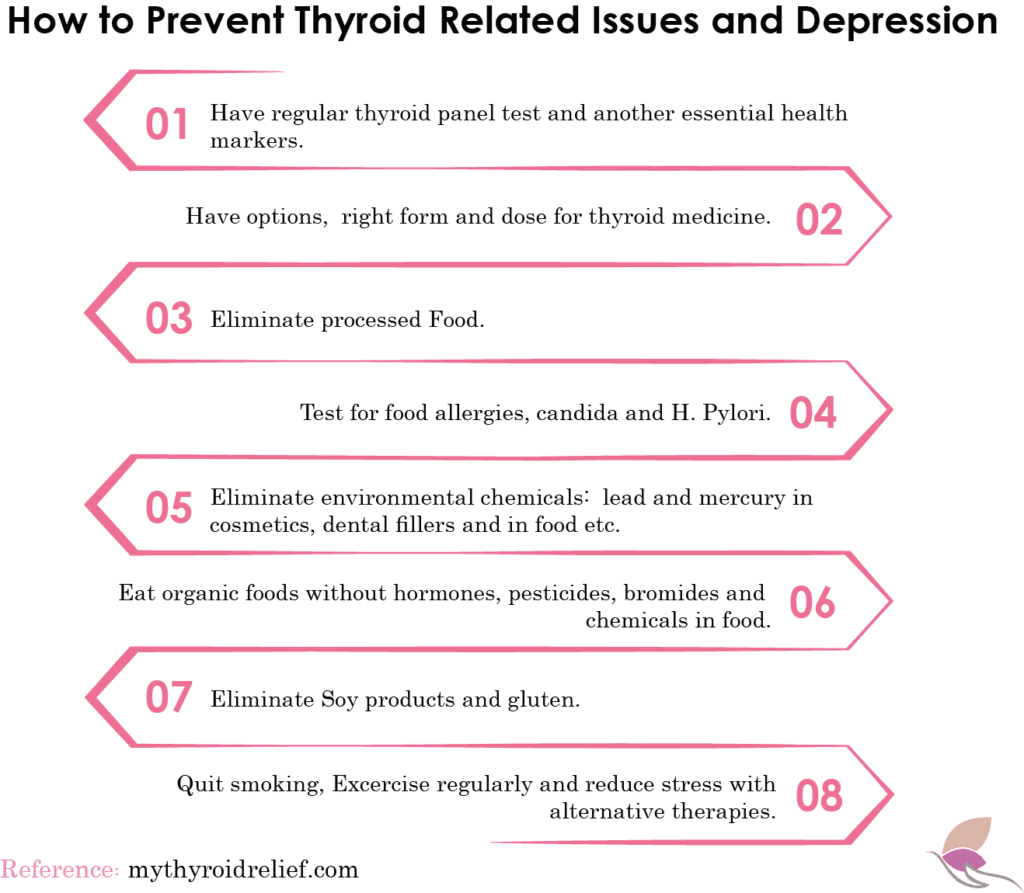
Keeping yourself healthy through optimal eating and proper supplementation, can aid in the prevention of thyroid illness. Some consider thyroid health closely linked to overall metabolic health.
Optimizing your metabolic, and thus thyroid health includes regular exercise, consuming organic foods and grass-fed and wild protein (minimizing extra hormones and pesticide), minimizing toxin exposure in our everyday goods and environment, routine monitoring of our Thyroid and sex hormone levels, identifying and removing psychological stresses, addressing emotional difficulties, and checking for vitamin and mineral deficiencies. Supplementation of selenium and zinc can help improve your immune function.
Regulation of Optimal Hormone Levels Keeps Depressive Signs and Symptoms in Control
Research shows that females have a higher overall risk of developing depression in their lifetime. This is thought to be linked to variations in gonadal (sex) hormone concentrations during menstrual cycles.Just like other hormones, Estrogen influences other hormones and signaling molecules like the neurotransmitters, dopamine, GABA, and serotonin.In the same vein, lower levels of testosterone affect both males and females and can be an indicator of depression. In some cases, hormonal levels can be normalized with the use of bioidentical hormone replacement therapy. However, this type of therapy should be directed by a health professional and will require frequent monitoring of blood hormone levels.
Medications That Can Cause Depression
Many medications can worsen or trigger depressive signs and symptoms. For instance, people taking Lithium for bipolar disorder have an increased risk of developing hypothyroidism. SSRI medications prescribed to treat depression can disturb our T4 hormone levels, reducing T4 and in turn dysregulated other hormone levels.
The thyroid gland uses iodine to produce T3 and T4. When thyroid hormones are required in greater amounts, the pituitary gland produces a signaling molecule called TSH. This in turn travels in the blood to the thyroid gland to induce production of T3 and T4.
Medications designed to treat hyperthyroidism (or the overproduction of thyroid hormones) disrupt this production system, and this causes thyroid gland shrinkage. Amiodarone, taken by heart patients can also cause shrinkage of the thyroid gland. Moreover, Interleukin-2 given to cancer patients can cause thyroiditis leading to hypothyroidism.Since iodine is critical in the production of thyroid hormone synthesis, any abnormalities of dietary iodine consumption can disrupt thyroid hormones.
As such, certain cough expectorants and iodine given for X-ray contrast studies may also induce hyperthyroidism.
Dietary Intake – How can Food Balance our Thyroid Levels and Optimize our Mental Health?
As mentioned before, thyroid health is often a reflection of our overall metabolic health. Dietary strategies that optimize metabolic health often help normalize thyroid function. For any thyroid abnormality, a diet that focuses on limiting inflammation can help restore a normal balance.
Specifically for hypothyroidism, consuming more organic vegetables (cucumber, eggplant, seaweeds, onion, green beans) walnuts, macadamia, hazelnuts, coconut, sesame, olive oil, butter, fruits, eggs, meat, wild salmon from Alaska, dairy, basil, parsley, thyme, and turmeric can be helpful.

Similarly, if you have hyperthyroidism, you must avoid iodine-rich foods, caffeine, and focus on foods high in antioxidants, magnesium, calcium, and vitamin D.
In general, a balanced diet with the right proteins (grass-fed, organic, and wild), carbohydrates with a minimal amount of gluten (such as rice), and healthy fats will help you keep a check on your mood and energy levels.
Food Allergies and Depression
Many food allergies release cytokines that trigger inflammation. This in turn can have a depressive effect on your body causing mood swings, sadness, irritability.Many studies suggest that depression can even worsen the effect of food allergies on your body. This can turn into a vicious cycle where inflammation caused by food allergies can affect mood poorly, which only worsens the pro-inflammatory state.Our gut flora is the naturally occurring bacterial composition that lives inside our intestinal tract. There are billions of microscopic bacteria living inside of us, mostly in the last part of our gut, our colon.When the health and balance of these microorganisms become disturbed, this naturally can negatively affect our health. A common gut flora problem is the overgrowth of H. pylori, a bacterium that is responsible for gastric ulcers.

Both H. pylori infection and symptoms related to food allergies can be ameliorated by consuming fermented food like yogurt, kimchi, miso, etc. as they contain good bacteria that we call probiotics.Additionally, probiotic bacteria can re-establish the normal bacterial composition in our colon. Specifically, probiotics are thought to help balance bacteria containing endotoxin. As the name suggests, endotoxin is a highly toxic and pro-inflammatory molecule that can cause significant illness (even death) in humans.If you suspect you have an H. pylori infection or have a history of gastric ulcers, H. pylori can be detected by a breath test or stool antigen test.
If you have recently taken an antibiotic course, particularly on a long-term basis, there is a high chance your normal gut flora is disturbed. Outside of probiotics and fermented food consumption, a stool microflora analysis can be helpful in determining the health and diversity of your gut bacteria. Beneficial microorganisms and bacteria found in naturally fermented diets generate enzymes that can help us fully digest our meals, allowing minerals to be absorbed more easily. Moreover, the healthy bacteria create nutrients such as the water-soluble B and C vitamins, increasing the nutritional content of the fermented meal.
Our gut health is often overlooked, but having a healthy, diverse gut microbiome is essential to keeping our bodies in a low inflammatory state, allowing complete digestion and absorption of essential nutrients, and ensuring that harmful toxins (like endotoxin) are not allowed access into our bodies. Optimizing our gut health can help improve our overall health, including normalizing thyroid function, all of which can contribute to good mental health and mood.
Additional Therapies that Can Help with Depression
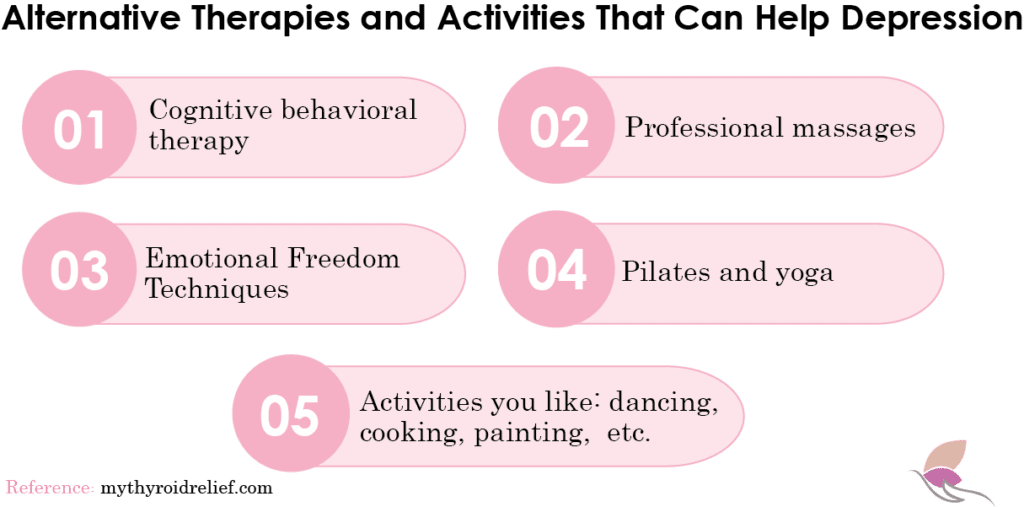
There are many psychological-based therapies that focus on the thoughts, feelings, and emotions related to mental illness. Some of these treatments are psychodynamic therapy, cognitive behavior therapy, and interpersonal therapy.
In looking at psychodynamic therapy, a mental health professional attempts to help a client understand what long-standing issues from the past might be causing psychic tension.This assists the individual in becoming fully self-aware and bringing what is subconscious into consciousness. It emphasizes the idea that several of life’s problems are the consequence of unseen psychological processes.Cognitive behavior therapy (CBT) is a form of talking therapy that concentrates on how your ideas, beliefs, and emotions impact your feelings and behavior.It also emphasizes educating the client on methods and thought patterns that can be useful for handling a variety of situations.For Interpersonal Therapy, one key notion is that emotional symptoms might be seen as a reaction to present challenges in everyday connections with other individuals. It seeks to identify and resolve these present challenges to bring symptomatic recovery.Outside of psychological-based treatments, there are specific modalities designed to bring about stress reduction and relaxation, all of which can improve mood and mental health.Professional massages can go a long way to relieve physical stress and are a good form of self-care. Emotional Freedom Techniques (EFT) are also very helpful.
Yoga is found to be very effective to release negative energy and develop a positive mindset. Mindfulness or meditation practice is an activity that can promote good mental health as well.

Moreover, doing activities you like, such as cooking, painting, gardening, cycling can also help you to centralize your energy positively.
Setting up a routine and establishing small daily goals will help you to be productive and prevent negative thoughts. It is said that a healthy mind is a healthy body, so taking action to improve mental health, will help keep physical health on track.
Setting up a routine and establishing small daily goals will help you to be productive and prevent negative thoughts. It is said that a healthy mind is a healthy body, so taking action to improve mental health, will help keep physical health on track.
Vitamins and Supplements to Help Depression
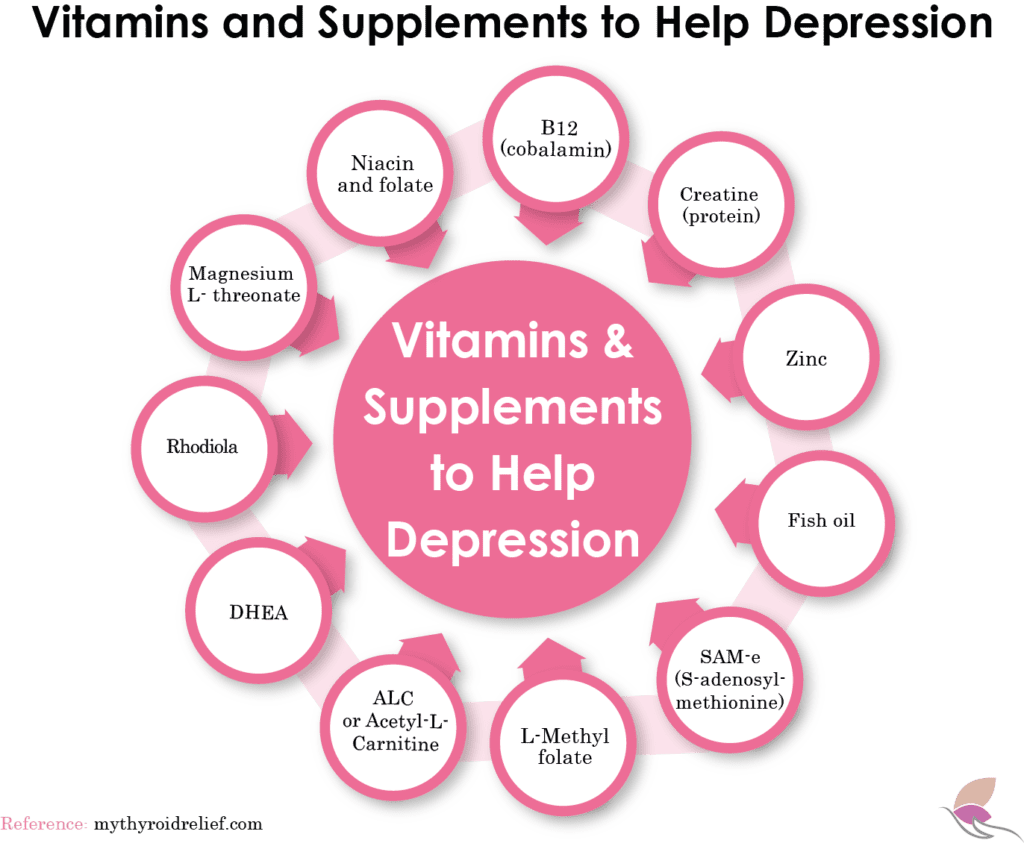
- Niacin and folate can prevent depressive moods as the B vitamins, in general, can play a vital role in managing depression. Omega-3 fatty acids, Vitamin C, Vitamin D-3, magnesium, melatonin intake can help cope with seasonal depressive episodes.
- B12 (cobalamin) has been found to delay the onset of depressive symptoms.
- Similarly, zinc deficiency is commonly found in people with depression.
- Creatine (protein) is also thought to have a role in maintaining brain energy levels. Many studies have suggested its intake might improve symptoms of depression.
- Fish oil
supplementation particularly those containing greater levels of EPA can help patients suffering from depression. They tend to be most effective in people who are currently taking antidepressants.
- There is some evidence that SAM-e (S-adenosylmethionine) might help people cope with depression and has better results than placebo.
- L-Methyl folate which is a bioactive type of folic acid helps increase the effect of other antidepressants. It boosts energy levels and helps in controlling depression.
- ALC or Acetyl-L-Carnitine has been shown to be more effective than placebo in the treatment of depression and more tolerable compared to other antidepressants. Studies have shown that ALC blood concentrations are lower in depressed subjects than in non-depressed participants, and concentrations were found to decrease with increasing duration of depression and/or intensity; clients with therapy-resistant depression as well as a history of early life emotional pain seemed to have the lowest concentration of ALC.
- DHEA is a precursor of cortisol. It plays a contributing role in mood elevation and decreasing stress.
- Moreover, Lavender tea (Lavandula angustifolia) is thought to have anxiety and stress-reducing effects due to its aroma. It also helps to prevent stress and depression.
- Rhodiola is an adaptogen that increases stress tolerance and has properties to reduce fatigue.
- Magnesium intake is believed to reduce the likelihood of developing depression as well as helping to decrease stress symptoms.
- Magnesium L- threonate
has a role in improving memory as well. It is generally tolerated better than non-chelated Magnesium salts, with fewer GI symptoms. Mg-threonate can also help promote better sleep.
Conclusion
Depression is a complex mental health concern that is becoming increasingly more common. The recent viral pandemic has only elevated this concern to levels we have not yet fully appreciated.
It is important to remember that depression is a medical condition, and it should be addressed as such. What’s more, depression can arise in the setting of specific medical conditions. Any hormonal imbalance can cause poor mental health, but thyroid abnormalities are notorious causes of depression and other mental illness concerns.If you are suffering from depression, it is important to rule out and address possible medical conditions that may be causing and/or contributing to your depression.If you have found your depression is the result of a thyroid condition, remember that other hormone levels, including sex hormones and stress hormones, might be out of balance as well. And along with this, it’s important to keep in mind that weight changes can occur as the result of hormonal imbalances.But always remember there is hope. Your body is a whole entity, and while you may have separate organs and systems, it may be most effective to address your mental health and overall health holistically.Then begin work to optimize your diet. Find low-inflammatory foods, seek organic produce to avoid unnecessary pesticides, and eat high-quality, wild meats.A diet rich in antioxidants and vitamins can also be useful. Don’t forget to look after your gut health and try some fermented foods like kimchi or yogurt. All these actions can help promote overall health and thus restore good mental health.
And of course, combine a good diet with other therapies as needed. Use a psychological-based treatment if you know a trusted mental health professional. Work on mindfulness and overall stress reduction.Yoga can be very effective, as well as movement in general. And finally, use supplements to help support you on your journey to good mental health.
The main thing to remember during all of this is that your healing process is a journey. You are where you are right now, and wherever that is on the health spectrum, that’s ok. Keep looking for ways to optimize areas of your life and take it one step at a time. Find a good routine and set some time aside to do something you love.
While depression seems to be more and more prevalent today, if we individually take personal responsibility for our wellbeing and remember to think holistically, we can begin to thrive with optimal mental health.
References
- https://www.healthline.com/nutrition/herbs-supplements-for-depression
- https://www.healthline.com/nutrition/hypothyroidism-diet
- https://www.medicalnewstoday.com/articles/thyroid-and-depression#s ummary
- https://www.webmd.com/women/features/thyroid-sleep-stress-reducti on
- https://www.verywellhealth.com/ways-to-reduce-thyroid-disease-risk- 3233225
- https://www.ncbi.nlm.nih.gov/pmc/articles/PMC3019023/
- https://www.ncbi.nlm.nih.gov/pmc/articles/PMC6753820/
- https://www.ncbi.nlm.nih.gov/pmc/articles/PMC3246784/
- https://academic.oup.com/jcem/article/99/4/1213/2537268?login=true
- https://pubmed.ncbi.nlm.nih.gov/15213363/
- https://www.researchgate.net/publication/8495604_Vasopressin_and_ oxytocin_release_and_the_thyroid_function
- https://www.ncbi.nlm.nih.gov/pmc/articles/PMC3520819/
- https://www.ncbi.nlm.nih.gov/pmc/articles/PMC3079864/
- https://www.pennmedicine.org/updates/blogs/womens-health/2019/ja nuary/how-thyroid-problems-might-be-hurting-your-sex-life
- https://bsd.biomedcentral.com/articles/10.1186/s13293-021-00367-2&l
- https://www.webmd.com/depression/guide/depression-the-thyroid-and-hormones
- https://www.who.int/news-room/fact-sheets/detail/depressionbr&l
I was just seeking this info for a while. After 6 hours of continuous Googleing, finally I got it in your website. I wonder what is the lack of Google strategy that do not rank this type of informative sites in top of the list. Normally the top web sites are full of garbage.
Hello,
I understand your frustration. It can be disheartening when valuable information is difficult to find. That’s precisely why I started this website—to provide people with high-quality, informative content about thyroid issues without the clutter. I’m glad you found what you were looking for here. If you have any questions or need further information, please don’t hesitate to ask!